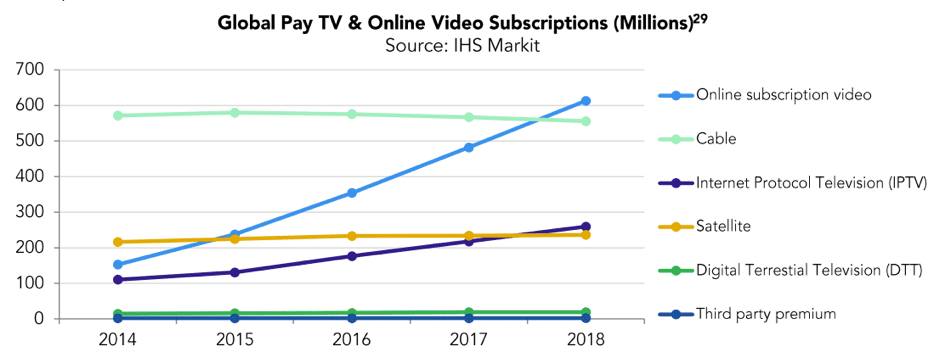Instagram trailling new video trackbar, Facebook banning white nationalism on its platforms, LinkedIn's new partnership with Adobe, Twitter highlighting politician's tweets that break community standards, Facebook's clamp down on political advertisers and online video subscriptions outstripping cable customers
This week has seen most of the big social media platforms release new features or make policy changes.
Facebook has banned content, searches and groups related to white nationalism and is also launching new requirements for political advertisers in a bid to make political ads more transparent.
Twitter is looking into ways of flagging tweets from politicians and public figures - including President Trump - that break community standards but shouldn't be deleted as they are in the public interest.
LinkedIn announced its new partnership with Adobe, which is aimed at offering better ad targeting on the platform.
In simpler news, Instagram seems to be trialling a new trackbar so users can skip through videos.
Other news this week is that global online video subscribers have reached higher figures than cable TV for the first time ever.
Find out more about all of these stories in this week's news roundup.
Instagram tracking new video trackbar
It looks like Instagram is tracking a new trackbar to allow you to fast-forward auto-play videos. The news comes from @wongmjane who regularly points out new and unreleased features on social media platforms.
Instagram is all about visual content, allowing users to post photos or videos. Video content on the platform can be up to a minute long, playing straight through to the end until you scroll past them.
However, if you reset your scroll through Insta (which can happen a lot by accident) and the video automatically plays again from the start, meaning users need to re-watch the whole thing to get to the point they were at previously.
To combat this issue, Instagram is trialling a trackbar that lets you choose where you want to watch the video from. Of course, this isn’t going to work for live videos, but it will make it much easier to get to the point that you’re interested in or to easily skip through a video.

Facebook bans white nationalism
Facebook has announced that it will be banning white nationalism and separatism from its platform following the New Zealand terrorist attack that was live-streamed.
In a blog, the social media platform said that all “praise, support and representation of white nationalism and separatism” would be banned from April 1st. The new content policy means that that the two subjects will be treated the same way as white supremacism, racist and hateful content that is based on ethnicity, race or religion on the platform.
Facebook said that the move has come as it is clear that the concepts of white nationalism and separatism are linked to organized hate groups, which have no place on the platform.
In its blog, the platform said: “We didn’t originally apply the same rationale to expressions of white nationalism and separatism because we were thinking about broader concepts of nationalism and separatism – things like American pride and Basque separatism, which are an important part of people’s identity.”
Facebook has also said that it needs to get better and faster at finding and removing hate from all of its platforms. While it has been making use of machine learning and artificial intelligence to find material from terrorist groups, it said that it knows it has work to do in order to improve.
As part of its fight to combat hate, Facebook will also be sending people who search for terms related to white supremacy on the platform to resources dedicated to helping people leave hate groups behind. Certain terms will now be directed to Life After Hate, which is an organization that provides education, crisis intervention and support.

LinkedIn partners with Adobe to deliver better ad targeting
LinkedIn is further improving its audience targeting capability by partnering with Adobe. The latest partnership will mean that the platform’s account-based marketing capabilities will be made available to users of the Adobe Experience Cloud.
Adobe explained that it “and Microsoft are aligning key data sources to populate account-based profiles in Adobe Experience Cloud, including Marketo Engage and Microsoft Dynamics 365 for Sales. This will empower B2B marketers and sellers to easily identify, understand and engage B2B customer buyer teams.”
The partnership will allow sales and marketing teams to better understand their audience, as it will provide data from LinkedIn, Microsoft Dynamics 365 and LinkedIn. Ultimately, this will allow organizations to target audiences in a more effective way, which could help improve campaign ROI.
It looks as though the partnership is aiming to provide Salesforce with some competition, as the company provides similar options for targeting and reach. However, Salesforce doesn’t have the in-depth information relating to careers that LinkedIn offers.
The move is LinkedIn’s latest attempt to make better use of its data and improve its advertising offering.

Twitter could ‘flag’ offensive Trump tweets
Twitter will be changing how tweets posted by a politician, dignitary or President Trump are displayed when they violate Twitter standards. Rather than removing tweets that might ultimately be in the public interest, Twitter will now add a note to rule-breaking tweets to let people know they the platform does not condone the content.
The news was delivered by Twitter’s head of legal, policy and trust and safety, Vijaya Gadde, who said that the platform is looking at ways or annotating offensive tweets that remain in the public interest. Speaking at the Technology 202 Live in San Francisco, she said that Twitter wants to uphold its community standards but ensure the platform can still be used for conversations that may be in the public interest.
Responding to questions from Elizabeth Dwoskin, a correspondent for the Washington Post, Ms Gadde said: “One of the things we’re working really closely on with our product and engineering folks is, ‘How can we label that?’ How can we put some context around it so people are aware that that content is actually a violation of our rules and it is serving a particular purpose in remaining on the platform?”
Currently, she said, there is no context around this type of content when it is left on the platform. This means that people assume that the content and the behaviour it represents are acceptable on Twitter, which isn’t the case.
This latest revelation follows on from comments made by Jack Dorsey, Twitter’s chief executive, last year. Mr Dorsey said that the platform is reconsidering core aspects of the platform to help reduce harassment and other forms of abuse.

Facebook clamps down further on political advertisers
Facebook is taking more steps to protect elections by clamping down further on political advertisers ahead of the EU elections. The platform will now require verifiable contact details to be provided before an advertising campaign can be run, in a move that is designed to counter accusations that Facebook lacks transparency when it comes to political messaging.
In a bid to show who is creating and paying for political advertisements on the social media platform, Facebook will require advertisers to provide information on where they sourced their funding from. This can be provided as an email address or phone number that directs people to the responsible organization. Advertisers posting content in a personal capacity will have to publish their name in order to have their campaign run.
Other requirements include advertisers having to prove they live in the country where their campaign is targeted, in a bid to stop foreign influences. They must also have their adverts stored in a database for seven years, which includes information relating to spend, targeting and reach. This database will be publicly accessible.
In a blog post addressing the changes, Richard Allan, head of global policy solutions at Facebook said: "These changes will not prevent abuse entirely. We’re up against smart, creative and well-funded adversaries who change their tactics as we spot abuse. But we believe that they will help prevent future interference in elections on Facebook."

Online video subscriptions outstrip cable customers
2018 saw the number of video subscribers across the globe overtake cable customers for the first time ever. According to the latest figures from The Motion Picture Association of America (MPAA), more people are now subscribing to services like Netflix and Amazon Prime than traditional TV options.
Online video subscriptions hit 613 million worldwide last year, representing a 27% increase on 2017’s figures. In comparison, cable customers dropped by 2% on the previous year’s figures, meaning just 556 million people are now using the service.
Despite the increase in online video subscriptions, cable still sees the highest revenue. Although the number of customers fell, revenues rose from $6.2 billion to $118 billion last year. In fact, online video subscription services were third in terms of revenue for 2018, falling behind satellite TV too.
In total, the theatrical and home entertainment sector grew by 9% in 2018 compared to 2017, finishing the year on a net worth of $96.8 billion. This is a 25% increase over a five-year period.
Charles Rivkin, chairman and chief executive of the MPAA, said: "In today’s dynamic marketplace, stories come to life for audiences in theatres, at home and on the go. Our companies continue to deliver content where, when and how audiences want it – and the number released today speak volumes."











